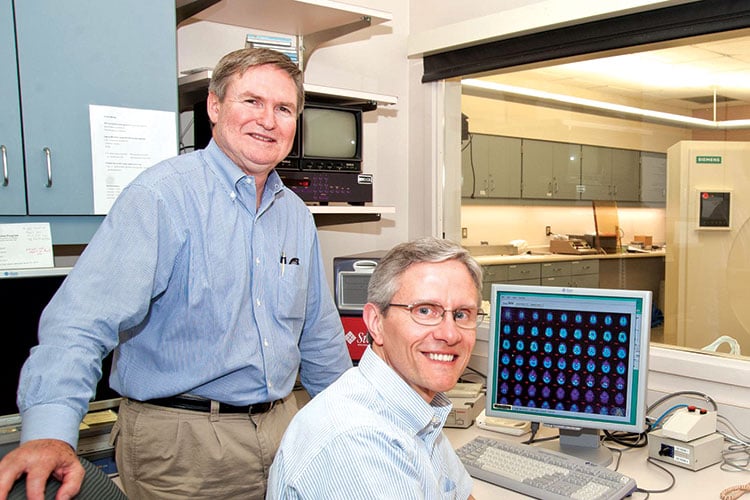William Klunk and Chester Mathis developed the brain scan capabilities that helped bring the first Alzheimer’s drugs to market. Now, Pitt innovators recruited to Pitt due to their influence are creating new blood tests to diagnose the disease even earlier, potentially making treatments more effective.
When renowned Pitt researchers William (Bill) Klunk and Chester (Chet) Mathis reunited on a recent Zoom call, fishing was the first order of business.
“So last night, Bill, I landed 12 fish! I cleaned up!” said a grinning Mathis, a wooded scene with a flowing stream set as his screen background.
Throughout the 1990s, Klunk and Mathis were eager young scientists with their hooks in the water, hoping to get hits on the molecules they were screening to find ones that would bind to amyloid plaques that accumulate in the brains of people with Alzheimer’s Disease.

At the time, the only way to diagnose Alzheimer’s definitively was through a post-mortem examination. Klunk and Mathis figured if they could attach radioactive atoms to a carrier molecule, it would show up on brain scans, confirming the diagnosis in living people. But developing a so-called “tracer” compound that could traverse the blood-brain barrier, the highly selective semi-permeable membrane that separates the blood in the brain’s capillaries from the brain tissue, turned into their elusive white whale.
Day after day, month after month, and year after year, they went home empty-handed as they screened hundreds of compounds with no luck. Then, in 2001, they decided to use different “bait”. They made a switch in their base molecule that successfully crossed the barrier and latched on to amyloid.
Pittsburgh Compound B, as their discovery became known, was first tested in collaboration with colleagues at the PET Research Centre in Uppsala, Sweden.The brain scans of that first patient clearly showed the amyloid deposits in a PET scan, confirming the diagnosis of Alzheimer’s for the first time in a living person.
It was a watershed moment in finally achieving their breakthrough. But their discovery was also bittersweet, as there were no effective treatments for Alzheimer’s. Pittsburgh Compound B helped change that.
GE Healthcare licensed the technology and brought it to market under the name Vizamyl. It has been used extensively in clinical trials of new Alzheimer’s drugs to measure their effectiveness. Last year, GE Healthcare gained FDA approval for a new clinical software tool allowing clinicians to determine the density of amyloid plaque in a patient’s brain from a PET scan and better evaluate their response to treatment. This follows the decision by the Centers for Medicare & Medicaid Services to expand coverage of amyloid PET scans in 2023.
Even as their own work is bearing increasing fruit, a new generation of Pitt innovators is forging new paths in Alzheimer’s research, demonstrating what’s possible at Pitt to continue building on the foundational work of predecessors.
Klunk pointed out one Pitt researcher in particular, Thomas Karikari, Assistant Professor of Psychiatry and Endowed Faculty Fellow in Peripheral Biomarkers for Brain Diseases, who is developing new blood tests for the amyloid plaques that amyloid PET binds to in the brain, as well as tau protein, which like amyloid plaques, accumulates in the brains of people who have Alzheimer’s.

“Dr. Klunk and Dr. Mathis’ breakthrough work on amyloid PET (positron emission tomography) was a landmark event that marked a permanently significant shift in the diagnosis of neurodegenerative diseases, especially Alzheimer’s disease,” Karikari said. “Another major impact is that amyloid PET redefined – I would say rebirthed – how pharmaceutical companies select participants for anti-amyloid therapeutic trials and monitor the success of the program.”
Karikari said Klunk and Mathis’ work has advanced personalized treatment approaches and enhanced research into neurodegenerative diseases, adding that, “Amyloid PET has become the ‘standard of truth’ method for quantifying amyloid burden in the brain in clinical and research contexts.”
Karikari and his colleagues are using patient cohorts that have been thoroughly examined using amyloid PET scanning to validate the accuracy of their new blood-based diagnostic tools.
“Our research program recognizes innovation as a basic tenet of what we do,” Karikari said. “We continue to strive to innovate new biomarker methods for various neurodegenerative proteinopathies and improve on existing methods by establishing novel ones that ensure cost effectiveness, clinical utility, and ease of use.”
Karikari’s work, published recently in Nature Medicine points to potential to develop new tests for Alzheimer’s that can measure tau protein in the brain up to a decade before it can be seen in brain scans. Early detection would allow for earlier clinical intervention.

Karikari is the lead inventor on seven invention disclosures submitted to the Innovation Institute, part of the Office of Innovation and Entrepreneurship. He has submitted four disclosures in March 2025 alone.
His work has been noticed. He recently received the Chancellor’s Distinguished Research Award and was recognized last year by Clarivate as a Highly Cited Researcher based on his publications ranking in the top 1% by citations in his field in the Web of Science.
Klunk and Mathis are pleased to see that Pitt is continuing to carry the torch for Alzheimer’s Disease research.
“The new things that are coming along may make our work a footnote in history in another 10 or 20 years,” Mathis said.
That’s OK with him. They did their part to advance the field and make an impact. Now they have gone fishing.
The Office of Innovation and Entrepreneurship provides education, mentorship, and funding to help Pitt innovators navigate their commercialization journeys. Whether you’re taking your first step by filing an invention disclosure or need assistance to de-risk your technology for potential external partnering or startup formation, our team is here to support you.
Check out our programs page to learn more about our offerings, or email us at OIEHelp@pitt.edu to connect with our experienced staff.